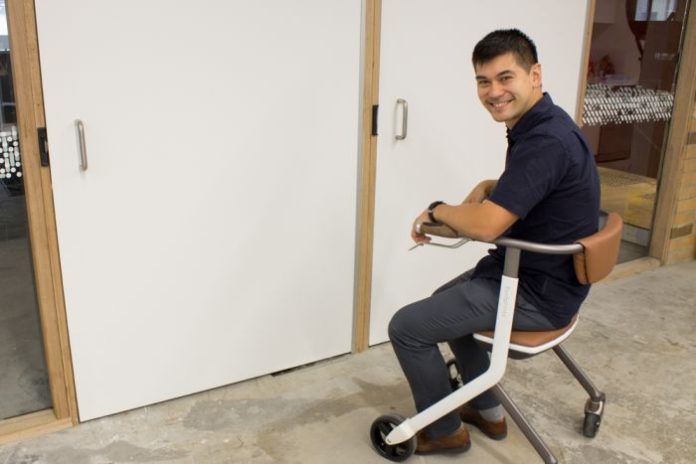
A Melbourne start-up company has reinvented the walking frame, turning the simple mobility aid into a hi-tech diagnostic tool.
The sleek white walking frame, called Footprints, includes a camera-like sensor which tracks the user’s feet to measure how well they are walking.
While not yet in production, the company behind Footprints claims the walking frame could prevent falls in the elderly.
The frame is the first product from Quanticare — founded by scientist and doctor of physiotherapy Phillip Goebel, robotics engineer Savant Krishna and business consultant Wesley Loh.
The company is based at Melbourne University’s Lab 14 “start-up accelerator”, at the former Royal Women’s Hospital building in Carlton.
“What we want to do is provide a tool for healthcare professionals to — instead of responding to a fall — respond to when there is deterioration in someone’s walking quality,” Dr Goebel said.
“If you think about someone walking across sand and leaving their footprints behind, essentially we are capturing aspects of those footprints.”
Elderly falls a ‘complex medical condition’
Earlier this year, the Royal Melbourne Hospital released statistics that revealed falls were the second biggest cause of admissions to the hospital in people over the age of 70.

Dr Goebel said the causes of falls varied from person to person, and preventing falls required a tailored approach.
“Falls are a very complex medical condition, there are lots of variables,” he said.
He said the Footprints frame could measure the limp of someone with osteoarthritis, for example, helping doctors better tailor the patient’s medication or physiotherapy.
It could also monitor the progression of a patient’s multiple sclerosis by measuring the difference between the their steps, and alert doctors if that difference becomes too great.
The device could also help residential aged care facilities diagnose urinary tract infections, meaning they can be treated before further complications occurred.
“Urinary tract infections often express themselves as acute deterioration in someone’s walking,” he said.
“Often times in hospitals you end up with someone with a urinary tract infection, plus a hip fracture because they had a fall.”
Frame could build ‘database of human gait’
Quanticare has entered into a collaboration agreement with a major multinational pharmaceutical company, and aim to have the device on the international market by 2017.
Beyond measuring a single person’s walk, the distribution of the device has the potential to be a boon to medical researchers.
“The long-term implication is that we could be building this massive database of human gait that we can apply modern machine learning and data science to,” Dr Goebel said.
